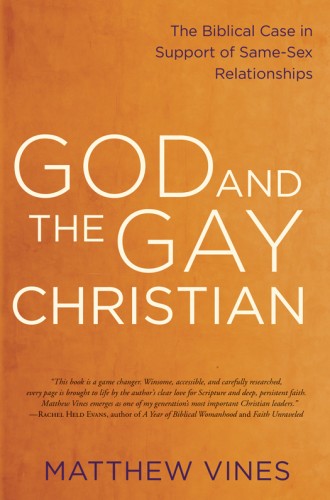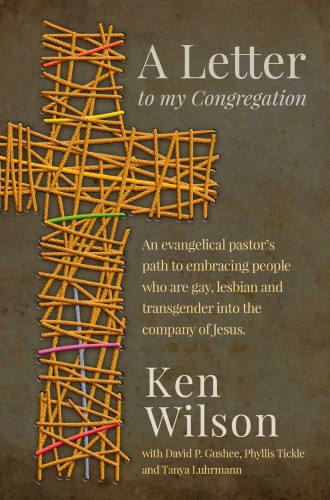Evangelical and gay
This past spring, when executives at World Vision announced that the Christian relief organization would hire gays who were legally married, the reaction among evangelicals was swift and fierce. About 10,000 people canceled their support for the Sponsor a Child program. Christian musicians who promote World Vision child sponsorships at concerts threatened to break ties. Evangelical leaders like John Piper, Franklin Graham, and Al Mohler tweeted their anger and disappointment.
Within 48 hours, World Vision retreated. World Vision president Richard Stearns issued a statement announcing the reversal, saying, “What we are affirming today is there are certain beliefs that are so core to our trinitarian faith that we must take a strong stand on those beliefs.”
Read our latest issue or browse back issues.
Readers may be surprised to learn that the definition of marriage as being for heterosexuals only is a core belief of trinitarian faith. The issue is never mentioned in a creed and was never discussed at an ecumenical council. Nevertheless, gay marriage continues to be a shibboleth in the evangelical world. Make that the shibboleth.
Most mainline denominations have in some way made their peace with gay marriage, and across the country acceptance has grown at an astounding rate, making it possibly the most rapid and peaceful civil rights campaign in history. According to Pew Research, 54 percent of Americans support same-sex marriage, a 20-point jump since 2001. Eighteen states have legalized gay marriage, 17 of those doing so since 2008. Culturally, gay marriage has passed the tipping point.
But clearly evangelicals are not close to the tipping point, as World Vision discovered. Evangelical denominations have released statements affirming that marriage is exclusively between a man and a woman. A 2013 statement of the Evangelical Free Church, for example, refers to “same-sex ‘marriage’”—with the word marriage in quotation marks. “Because we do not believe this constitutes a God-ordained, biblically defined marriage, we have noted this by including quotation marks around the word throughout the statement.” That same year, Rick Warren told CNN that he feared God’s disapproval if society altered its understanding of marriage.
But Rick Warren isn’t a pope, so it’s inevitable that evangelical leaders and their followers would begin peeling off from the pack, gently stepping into the minefield surrounding the topic of homosexuality and seeing if they can get through it without mortal injury.
Among the first to do this was Andrew Marin. Coming out of the Assemblies of God, Marin wrote the best-selling Love Is an Orientation (2009) and has been a regular on the evangelical speaking circuit. He has consciously avoided taking a side on gay marriage or gay ordination, however, preferring to present himself as a bridge builder between the church and the gay community. As a result, he is regularly taunted on Twitter—and even in the New York Times—by sex columnist and gay rights advocate Dan Savage, who wants Marin to declare gay sex either a sin or not a sin. Marin has not taken the bait.
Occupying a similar role is Justin Lee, founder of the Gay Christian Network, an organization “dedicated to building bridges and offering support for those caught in the crossfire of one of today’s most divisive culture wars.” The main difference between Marin and Lee is that Lee, who identifies himself as an evangelical Christian, is gay. In his book Torn: Rescuing the Gospel from the Gays-vs.-Christians Debate (2012), he advocates for lifelong monogamy as a responsible option for LGBT persons and argues that his position is not contrary to the Bible.
Neither Marin nor Lee was an evangelical leader before they took up this issue, and both are still young men. Among the older, established cohort of evangelical leaders, none has budged on the issue, including moderates such as Richard Mouw, longtime president of Fuller Theological Seminary, and popular speaker Tony Campolo. (One exception might be social justice advocate Jim Wallis, though he is arguably outside most evangelicals’ own definition of mainstream evangelical. Jerry Falwell once famously said that Wallis is “as much an evangelical as an oak tree.”)
Can one be both an evangelical and affirming of gay relationships? The question raises another, long-debated question: What exactly is an evangelical? Presumably Campolo is, Mouw is, and Mohler is. Wallis says he is, but Falwell said he isn’t. Unlike the bounded set that is the mainline—bounded by membership and ordination—evangelicalism is a centered set and notoriously tricky to define. Generational differences also play a role here, with younger voices like Marin, Lee, and blogger and author Rachel Held Evans supporting gays in the church and older evangelicals either silent or vocally opposed.
Into the minefield have stepped two new voices, one from the younger generation of evangelicals and one from the older. The focus of their books is a verse-by-verse exegesis of the six “clobber verses” in the Bible that mention same-gender sexual intimacy.
Matthew Vines was a sophomore at Harvard when in 2010 he took a leave of absence from school to come to terms with his homosexuality and his Christian faith. Vines had grown up in a conservative Presbyterian church in Wichita, Kansas, and he went back to that city to study the Bible. In 2012, he gave a talk on his findings at College Hill United Methodist Church in Wichita, and the video of that talk went viral on YouTube. Vines parlayed the popularity of the video into the book God and the Gay Christian.
Ken Wilson is a lifelong pastor in the Vineyard movement, which grew out of the Jesus movement of the 1970s. Wilson started Vineyard Church of Ann Arbor, Michigan, in 1975 and has pastored that church ever since. Wilson’s book A Letter to My Congregation came after his own two-year journey.
Vines’s book is oddly lacking in autobiography. He briefly recounts the day that he came out to his parents—“my dad’s worst day”—but then gets right to his argument that long-term, monogamous, same-sex relationships are not contrary to the Bible because they’re never mentioned in the Bible.
Vines’s father plays a large role in the book. Vines the younger repeatedly tells how his father changed his mind on this verse or that view based on the study that the two undertook together. Although it’s clear that Matthew’s orientation was the impetus for the project, he never suggests that his own attempt to live as a holistic person or his father’s love for his son had any effect on changing either of their minds. They cast their stance as a totally intellectual decision: they studied the Bible and changed their minds. This book, Matthew hopes, will do the same for many others.
Wilson takes a very different tack, talking openly about his heart being changed. As a charismatic Christian, Wilson has no trouble attributing his change of heart and mind to the provocation of the Holy Spirit. This isn’t just about the intellect for Wilson but also about being open to the active movement of God in the world and in the heart of the believer. So ultimately the issue is not just about what the Bible says but about what the Spirit whispers.
Wilson frequently cites Bible scholars N. T. Wright and Richard Hays, both of whom are on record as opposing the normalization of gay relationships in church or society. Wilson defers to their scholarship, but not to their conclusions. As he sees it, his pastoral office trumps their scholarship.
But I am a pastor. When I am expected (or urged) to exclude those who otherwise bear the marks of the Spirit in their lives on the basis of these texts, I have to face the problems associated with applying the prohibitions to people in modern-day monogamous gay relationships.
This winter, as I was speaking at a retreat for a large Episcopal church on the Eastern seaboard, the rector interrupted me. “Tony,” he said kindly, “the truth is that we just don’t care as much about the Bible as you do.” He went on to explain that while the Bible is important, it is far from the only source of revelation for him and his parishioners.
In that vein, many mainliners will be perplexed—maybe even frustrated—by how much ink Vines and Wilson spill on the six verses in the Bible that deal explicitly with same-sex relations. But they are, after all, evangelicals, and they repeatedly make it clear that the Bible is the foundation of everything in their faith.
But the two approach these verses in different ways. Vines begins by quoting dozens of classical texts to show that same-gender sexual activity was well known in the ancient world, whereas committed same-sex relationships were not. This point is the crux of Vines’s argument: the same-gender sexual intimacy that is prohibited by the six clobber verses is not equivalent to the monogamy practiced by many gay couples today. Modern-day gay couples weren’t known by Paul, so they couldn’t have been condemned by Paul. (The extension of this argument, which Vines doesn’t go so far as to make, is that had Paul known of faithful same-sex relationships, he would have approved of them—but that claim is tenuous at best.)
As anyone who’s done graduate work knows, footnotes are political. Critics will scour a book’s footnotes, looking for a weakness. Evangelicals looking for Wright or Hays won’t find them in Vines’s book. They’ll find Tim Keller, John Piper, and Robert Gagnon, all evangelical and firmly opposed to acceptance of gay marriage. But much to their chagrin, they will also find references to Dale Martin, who is both quoted affirmatively in the text and thanked in the acknowledgments.
Martin is a professor of New Testament at Yale, a gay man, and the author of Sex and the Single Savior (2006), in which he argues for the ultimate indeterminacy of biblical texts. That’s three strikes against Vines’s most authoritative scholar, at least in the eyes of most evangelicals.
Like Vines, Wilson argues that the key verses, in their original contexts, did not speak directly to same-sex relationships; they merely prohibited promiscuity. But for his central thesis he turns to Paul’s letter to the Romans and proffers an extended meditation on chapters 14 and 15. In those chapters, Paul takes up the issue of vegetarianism in the church and exhorts the Christians in Rome to stop judging one another. “Do not, for the sake of food, destroy the work of God,” Paul pleads.
Wilson says these chapters shows that some matters in the church are disputable. The ancient church had room for both vegetarians and meat eaters. The modern church, Wilson claims, must acknowledge that the status of LGBT persons and their relationships is a disputable matter and therefore should make room for those on both sides of the issue. This is the promised “third way” of Wilson’s book.
Vines, on the other hand, admits that he’s not proposing anything original. He’s saying that the church has misinterpreted some verses for centuries and now has a chance to revise its reading. Vines says that encouraging celibacy among gays is fine, but mandating it is unbiblical. And he argues that human beings are “imprinted for relationship” and “created for covenant,” meaning that the church should celebrate gay marriage as in keeping with God’s plan.
In one sense, it’s not that difficult to deal with the six clobber verses hermeneutically: you simply need to put them in a category of biblical passages that do not directly apply to Christians today, along with verses about eating shrimp, wearing clothes of mixed fiber, and allowing women to speak in church. Problem solved. But if you do make that move, conservative evangelicals will argue, you’re on the slippery slope to biblical relativism.
What has incensed evangelical leaders about Vines’s book is that he insists on calling himself a conservative evangelical. The marketing copy refers to Vines as a “theologically conservative, gay Christian,” and in the introduction Vines writes, “Christians who affirm the full authority of scripture can also affirm committed, monogamous same-sex relationships.”
In response, Southern Baptist Theological Seminary, before Vines’s book even came out, released a free e-book, God and the Gay Christian? A Response to Matthew Vines, with essays by professors from that school. In the introduction to that book, seminary president Albert Mohler writes,
If Vines were to be truly successful in simultaneously making his case and remaining true to the scriptures, we would indeed have to overturn 2,000 years of the church’s teaching on sex and marriage and apologize for the horrible embarrassment of being wrong for so long.
Of course, Mohler and his compatriots think that Vines is not successful, and they go to great lengths to argue against his biblical interpretations.
Wilson claims to have discovered a new, third way on this issue, a way between affirming gays and excluding them. I find Wilson’s thesis appealing. I’d like to think that it’s possible for a congregation to be a safe harbor for those who affirm gays in the church, for those who do not, and for those who have not yet made up their minds. Maybe Vineyard Church of Ann Arbor is just such a place. But I’m doubtful.
Many church groups will surely read Vines’s and Wilson’s books and find them compelling. Classes will be convened, listening sessions will be held, and sermons will be preached. As long as the issue remains a theoretical or intellectual one, a congregation can probably be a third-way place.
But what happens when the pastor is asked to perform a gay wedding in the sanctuary? People on one side or the other will start to leave and find a church that better suits them. It’s in the practices of inclusion or exclusion that congregations make their decisions on this matter. And it’s over the practices that congregations and denominations divide.
All those who support the full inclusion of LGBT persons in the church have their go-to book—the one they give people who are struggling with this issue. For years, mine has been William Stacy Johnson’s A Time to Embrace. Vines’s and Wilson’s books will surely become that book for some people in the evangelical world.
In the end, every person and every congregation needs to make a choice. Will they affirm the full humanity and imago dei of LGBT persons or not? Will they perform same-sex weddings or not? Will they hire LGBT pastors or not? I hope that these two books convince more evangelical churches that the answer to all three questions is yes.







